Does Chocolate Have Caffeine?
Chocolate is an all-time favorite sweet treat enjoyed by people of all ages, but does chocolate have caffeine?
Yes, chocolate, especially dark chocolate, contains some caffeine, but not enough to provide the same caffeine boost as coffee.
Learn which types of chocolate have the highest caffeine levels and discover how to choose a healthy chocolate to enjoy a guilt-free indulgence.
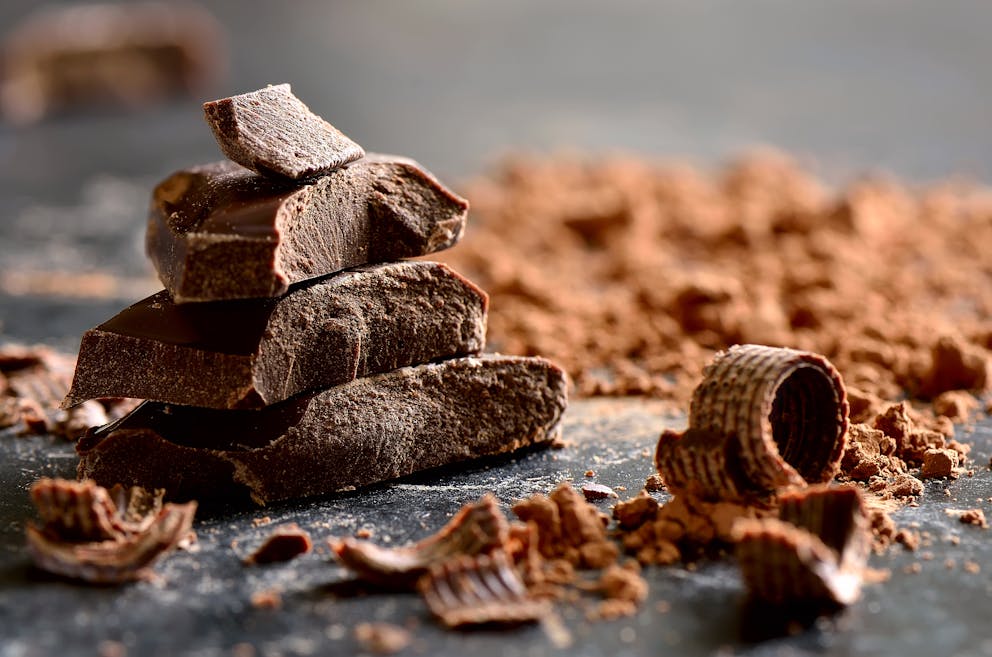
Does chocolate have caffeine?
Yes, certain types of chocolate contain caffeine. However, the caffeine content of chocolate depends on which part of the cocoa bean is used and how the chocolate has been processed.
The chocolate-making process begins by harvesting cocoa beans from cacao trees. Cocoa beans undergo drying and roasting and then are ground and separated into cocoa solids and cocoa butter, which can be processed into different types of chocolate.
Cocoa solids naturally contain some caffeine, whereas cocoa butter has zero caffeine. The amount of caffeine contained in chocolate depends on the ratio of cocoa solids to cocoa butter.
Dark chocolate contains more cocoa solids than milk chocolate, which explains why it tends to have the highest amount of caffeine, while white chocolate made with only cocoa butter and milk powder does not contain caffeine.
Watch the video below to learn more about the caffeine content in chocolate.
Does Chocolate Have Caffeine?
How much caffeine is in chocolate?
The precise caffeine content in chocolate is influenced by the type of cocoa bean used, the concentrations of cocoa solids present in the chocolate, and the processing technique employed.
Here’s the caffeine content of different types of chocolate per one-ounce serving:
Dark chocolate with 85 percent cacao solids: 22 milligrams
Dark chocolate with 45 percent cocoa solids: 12 milligrams
Unsweetened baking chocolate: 23 milligrams
Milk chocolate: 6 milligrams
White chocolate: 0 milligrams
The caffeine content of chocolate, even dark chocolate, is relatively low compared to freshly brewed coffee, which typically contains between 80 and 100 milligrams of caffeine per cup.

Possible side effects of chocolate
Eating chocolate in moderation doesn't tend to have significant side effects.
However, excessive intake of dark chocolate can cause caffeine-related sleep issues and restlessness, with some caffeine-sensitive individuals can develop migraines after consuming chocolate.
Many chocolate products are high in sugar, which contributes to weight gain, tooth decay, and an increased risk of insulin resistance and diabetes.
In addition, individuals with sensitive digestive tracts can experience acid reflux, bloating, or abdominal pain after eating chocolate with a high cocoa content.
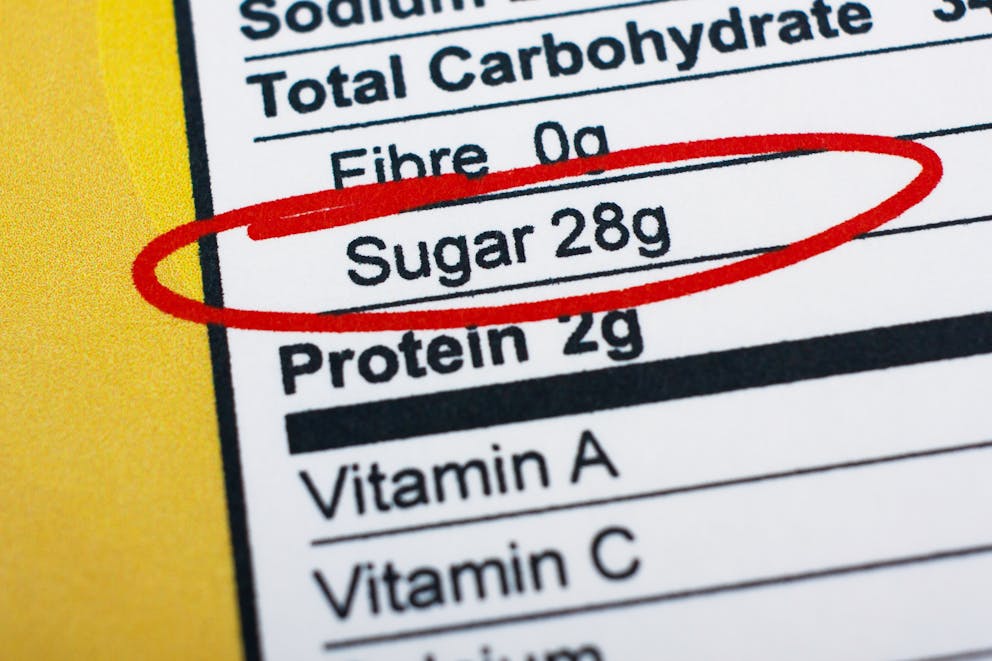
What is the healthiest chocolate?
Research published in Foods suggests that many of chocolate’s health benefits are attributed to its high concentrations of antioxidants and flavonoids, which are predominantly found in cocoa solids, making dark chocolate a significantly better choice than white or milk chocolate.
It’s also crucial to avoid chocolate products containing sugars, preservatives, artificial colorings, and flavorings, which can contribute to weight gain, food sensitivities, poor liver function, and inflammation.
Opt for minimally processed chocolate made with natural ingredients and sweetened with sugar alternatives such as monk fruit, stevia, or erythritol.
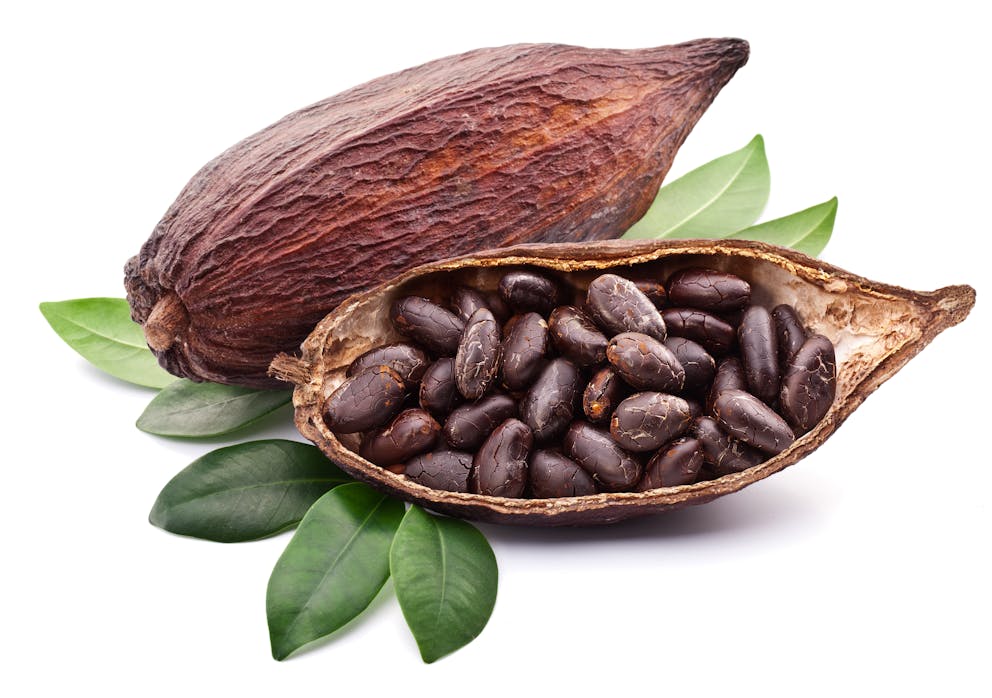
Health benefits of dark chocolate
Not only is chocolate a delicious treat, but regularly consuming moderate amounts of dark chocolate can positively affect your health and well-being.
Here are three health benefits of dark chocolate.
1. May help lower inflammation
Cocoa contains various anti-inflammatory polyphenols, and eating dark chocolate may help lower chronic inflammation, which is a leading factor in the development of many health conditions, including Alzheimer’s and cardiovascular disease.
This has been confirmed by a study published in Current Research in Food Science, summarizing, “Polyphenols are a main component in dark chocolate linked to a lower risk of various inflammatory diseases, high blood pressure, and atherosclerosis.”
2. Supports brain function
Chocolate consumption triggers the release of endorphins and stimulates serotonin production, a neurotransmitter that regulates moods, making chocolate a natural mood elevator.
“Chocolate contains theobromine, a potent vasodilator that widens blood vessels and increases blood flow,’ explains Dr. Berg. “This promotes the transport of oxygen and nutrients to brain tissue, linked to better brain health, mental clarity, and focus.”
3. Promotes heart health
Cocoa is a rich source of anti-inflammatory polyphenols and blood-pressure-lowering theobromine, which work in synergy to promote vascular health and lower the risk of atherosclerosis, a leading cause of heart attacks and stroke.
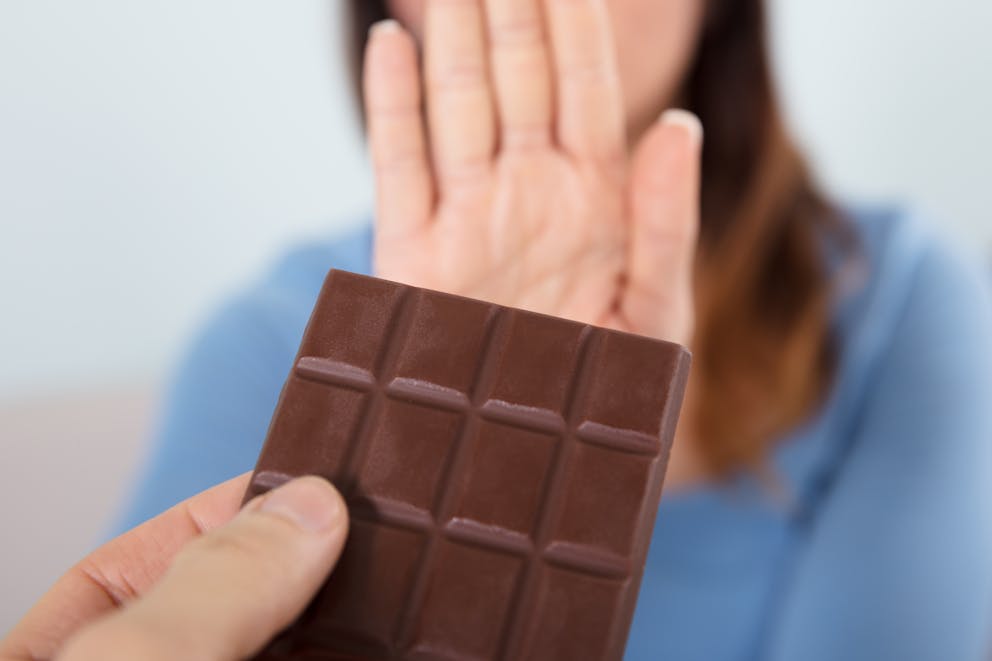
Who should avoid chocolate
Individuals sensitive to caffeine and those who limit caffeine intake due to an irregular heart rhythm, coronary artery disease, or high blood pressure should avoid dark chocolate.
It’s recommended that pregnant and breastfeeding mothers limit caffeine intake to no more than 200 milligrams per day, and it’s crucial to consider the additional caffeine intake from dark chocolate to avoid exceeding recommended limits during pregnancy and lactation.
In addition, those with insomnia may benefit from avoiding dark chocolate as it contains both caffeine and theobromine, two naturally occurring stimulants that can exacerbate sleep issues.
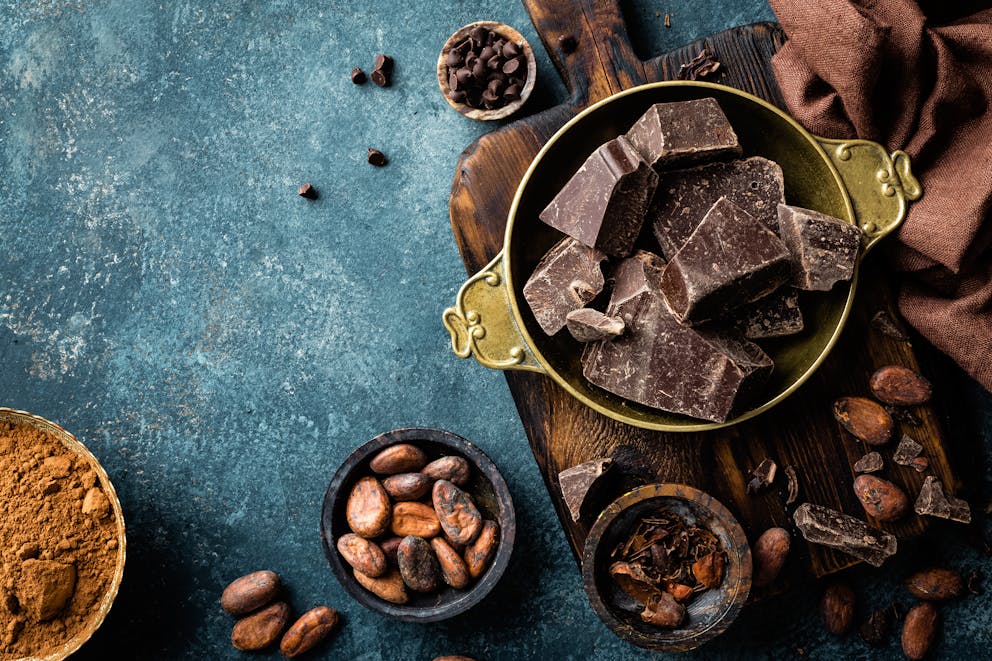
Key takeaways
Does chocolate have caffeine? The answer is yes, some kinds of chocolate contain caffeine, although significantly less than coffee or tea.
While dark chocolate contains more caffeine than milk or white chocolate, it’s a rich source of health-promoting polyphenols linked to various health benefits, including a lower risk of chronic inflammation and heart disease.
FAQ
1. Does chocolate contain caffeine?
Yes, certain varieties of chocolates, especially dark chocolates, contain caffeine. However, chocolate tends to have significantly less caffeine than coffee or tea.
2. How much caffeine is in one serving of chocolate?
A one-ounce serving of dark chocolate contains around 22 mg of caffeine, milk chocolate has around 6 mg of caffeine, and white chocolate is caffeine-free.
3. Which has more caffeine, coffee or chocolate?
An eight-ounce cup of coffee contains between 80 and 100 mg of caffeine, significantly more than dark chocolate, which typically contains around 20 mg per ounce.
4. Can you eat chocolate if you don't have caffeine?
You can have chocolate if you don’t consume caffeine by choosing caffeine-free chocolate products such as white chocolate or decaffeinated dark chocolate.
However, white and milk chocolates are often high in sugar, and it’s best to opt for caffeine-free chocolate sweetened with natural sugar alternatives such as stevia or monk fruit to avoid weight gain and other sugar-related health issues.
5. Can the caffeine in chocolate keep you up at night?
Yes, the caffeine in dark chocolate can cause restlessness and sleep issues in caffeine-sensitive individuals, especially if chocolate is consumed later in the day.
6. What kind of chocolate has the most caffeine?
Caffeine is naturally present in cocoa solids, which explains why dark chocolate has the highest caffeine content, as it contains more cocoa solids than milk chocolate or white chocolate.
7. Does hot chocolate have caffeine?
Hot cocoa made with unsweetened dark cocoa powder can contain as much as 25 mg of caffeine per cup.
However, cocoa powders made with milk chocolate tend to have significantly less caffeine, and many popular hot chocolate mixes are made with milk powder and flavorings that often don’t contain any caffeine.
Sources
Previous blog
Less Bowel Movements with Intermittent Fasting
Popular
08/21/2024
55.7K views
02/23/2025
46.8K views
11/18/2024
281.2K views
03/18/2024
11/21/2022




